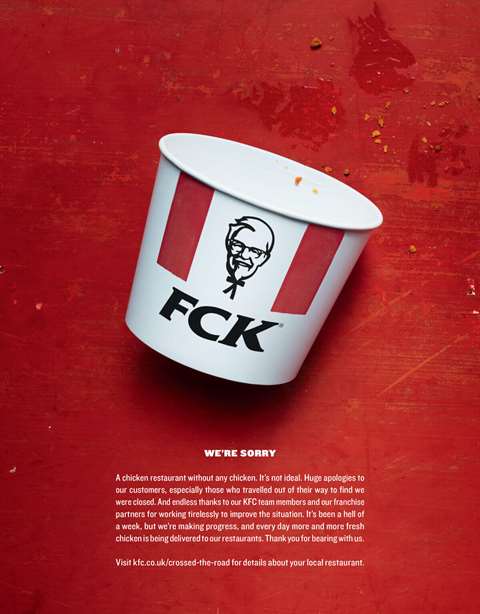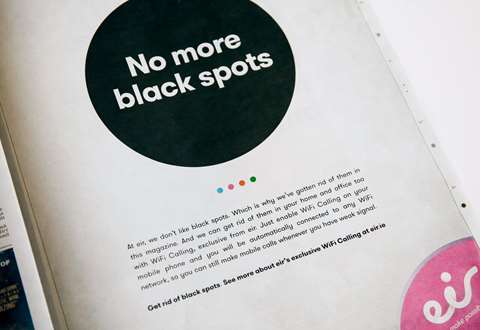The power of print at a glance
- Forget solus print – print as part of an integrated approach is the new world order
- As the digital invasion picked up pace, print lost its mojo – now, it needs some of that old-school swagger back
- Print can be disruptive, as long as there’s a big idea behind it
This year, Terry Savage steps down from his role as Cannes Lions chairman after 33 years in charge of the world’s biggest creative festival.
In that time, the industry has been forced to evolve in varied and unexpected ways in response to the growing challenges of the digital landscape.
The world of advertising, marketing and communication is almost unrecognisable to the one he surveyed at his first Cannes in 1986.
That was the year that BMP won the Grand Prix Lion at Cannes for its famous ‘Points of View’ campaign for The Guardian – in which footage of a skinhead apparently attacking a businessman is shown from a different angle to reveal he was actually saving him from debris falling from a building site.
At the time, it was held up by the judges as an exemplar of using moving images to celebrate the fact there are things you can only do in print.
From today’s perspective, though, it reveals a very different era, in which confidence in print’s power for storytelling was undiminished by talk of joined-up campaigns and multi-platform offerings. But for his part, Savage still believes in that power. It’s just that – in his words: “Creativity in 2018 comes from everywhere.”
Life lesson: nobody should go it alone
This means, of course, that print is rarely relied on to deliver on a marketing brief entirely on its own.
“I think it’s probably a rarity that solus print is used,” admits Savage. “The reality in the new world order is that print is most often used as part of an integrated campaign – and not always with digital. I guess it’s neither positive or negative – and just a fact that the power of the platforms and data has become a massive force.”
He suggests that “mobile has become the ‘hand tool’, and by definition print has suffered” – but adds that “a good campaign, done powerfully, from a creative perspective can still resonate in print”.
The bit where we talk about that Burger King campaign again…
One needs only look at last year’s big winners to see how disruptive print can be in a digital-first environment.
Like Twitter’s use of traditional billboards for its 2017 Outdoor Grand Prix, featuring iconic images and cultural figures superimposed with the ubiquitous hashtag symbol: an example how print continues to offer a simple, elegant and arresting solution.
Or Burger King’s Burning Stores campaign by David Miami, which won the Print & Publishing Grand Prix.
Its series of images of real stores on fire emphasised the ‘flame-grilled’ theme in a way that aped the authenticity of social media’s ‘always-on’ approach – and succinctly demonstrated how print remains one of the best mirrors of the times.
Both communicate a lesson Savage is keen to point out: “no matter what the medium, you need a big idea at the heart of any campaign”.
Indeed, the opportunity for print to be the ‘disruptive’ element within a campaign – in the sense of ‘quiet is the new loud’ – is a key consideration. “If the idea is big and bold, any medium can be disruptive – that is an important factor when using print: make sure the work is creative,” he adds.
And the Darwin Award doesn’t go to…
Of course, it’s not only the print medium that has had to make bold decisions in order to evolve with the times. Savage recalls how the Festival “was able to recognise and adapt to key changes in the industry” during his tenure.
Not that it was without controversy. The expanded number of categories and entries introduced during his chairmanship received criticism in some circles that Cannes Lions was more about money-spinning than rewarding creativity.
Savage disagrees. He views it rather as a reflection of the dynamic and ever-more nuanced environment that advertising and communication now finds itself in.
“The rate of change the industry experienced – and continues to experience – means that not everyone can run at the same pace,” he says. “So, balancing globally the message between the rates of change can be challenging.”
Indeed, Cannes Lions adopted the full name of Cannes Lions International Festival of Creativity in 2011 to reflect these changes in the business. To continue to simply call it an ‘advertising festival’ would have been to ignore the fact that advertising is now just one strand of how marketeers reach out to their audiences.
And sometimes, of course, the medium is the message: so, changing technologies need to be acknowledged and celebrated themselves.
While the renaming of the festival has been seen by many as a pivotal moment in the shift in balance of the relationship between print and digital, Savage prefers to look at it as a natural process of evolution.
“I don’t think there was one moment,” he says. “Just a relentless drive forward, as reading habits and instant access changed the world.”
But he is adamant there is a still a vital role for print. “I think those publications that offer quality insight and reporting have positioned themselves as being relevant and important.”
Er… any chance of a print plug, Terry? Ta…
Now, afforded the opportunity to look back over a long, influential career, Savage reflects on the thing he feels most proud to have brought to the table: “I know that the Cannes experience – be it on a jury or as a delegate – has changed people’s lives for the better, and been a constant source of learning and inspiration.”
So, what words of encouragement can he give to those working in print that there is a future for them within a joined-up strategy?
“I think that creativity is [always] an opportunity for the industry to embrace,” he says. “Great work gets noticed – and consistent great work even more so. An emphasis on creative print ads within publications is an opportunity as ever…”
Get some insights into KFC’s gold Cannes Lion winner in the Print & Publishing category.





